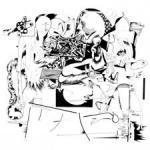
Adventure Weird Work
(Carpark Records)
Adventure’s Benny Boeldt may be as well known as part of Baltimore’s Wham City Arts Collective as he is anywhere. The connection led to a split recording with fellow Wham City Arts collaborator Dan Deacon in 2009, released on Carpark, who’ve been releasing his music since 2008.
His most blatant influence comes from retro video games and the Sega Genesis catalogue in particular, validating the artistry of video games and their wider influence. Weird Work undoubtedly continues on the theme but incorporates an intensity rarely found in soundtrack. Clearly, Boeldt wants to project through the lens of artifice and dimensional uncertainty, exploring the connection of fictional vicariousness and the reality of feeling.
There is an undoubted sense of urban reflection on the record, with the fractured style echoing a frenetic perception of city life. Unease pervades throughout, with a lack of definition between tracks contributing to immersion in an abrasive underworld. Any human contribution is masked by vocoda or abstract effect, in which an unidentifiable force pounds incessantly.
Likewise, in the narrative of the song titles there is a sense of becoming lost: Nervous, Reality Shift, Alone, Constantly, Catching Up. As an initial barrage of sound, Weird Work can seem overpowering; but as we begin to divulge pockets of sense in the chaos, such as through the barely intelligible language of Constantly, there is a profound realisation.
That the record is unaccommodating, discomforting and disorientating in a way which serves to alienate; that there is such a spew of noise all individuals aspects lose integrity; that the high pitch convulsions distract from interesting aspects beneath; that it’s single minded approach barely deviates from a particular vomited expression speaks to imprint precisely that feeling into the listener.
If anything, Weird Work is a social commentary which reflects exactly that which society produces. Any personal taste for a more reductive approach becomes benign when one considers the purpose of the record. If it comes across as impregnably ruthless, then it is what it reflects. If there seems a sadistic insistence in never ending dissonance, it has achieved what it set out to do. And if you are uncomfortable, alienated and overwhelmed, then you are receiving the effect of the record directly. What else could you ask a piece of music to do?
17 April, 2013 - 04:32 — Matt Bevington